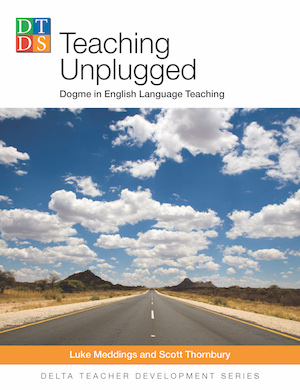Teaching Unplugged

This article is about a lightweight many of you already know: Luke Meddings and Scott Thornbury’s book, about their conversation-driven, materials-light teaching philosophy that focuses on what matters to the learners and on language emerging from the conversations about it, is only 100 pages long and weighs less than 250 grams! The slender paperback, however, is small but mighty and provides anybody who would like to teach unplugged, from beginners to seasoned multilinguists, with an invaluable tool.
After a detailed two-page index you will find three chapters. The theoretical part A is condensed on only 14 pages. Here the theory and methodology is explained, with plenty of practical tips (e.g. 10 strategies to involve students). Part B focuses on how to manage and promote conversation, focus on form and learn from lesson to lesson, providing a wealth of new and exemplary activities, most of them requiring little or no preparation. Many of the activities work on various stages of proficiency, even with learners of limited knowledge of English. Part C gives answers to criticism and the important questions the authors were asked in their web-based discussion group (http://groups.yahoo.com/group/dogme/), e.g. how to teach unplugged in different situations, from young learners, one-to-one, or as a non-native speaker, all the way to unplugging a whole school.
Like unplugged music, teaching unplugged is genuine and direct. Like the Dogme filmmakers, who wanted to do without special effects and focus on the story, Dogme ELT’s goal is to use less material, and fewer techniques and linguistic analyses; not to ban textbooks, but to use them critically and improve social interaction.
When teachers focus on the expertise and interests of their learners, providing scaffolding where needed, motivating them to explain, working with them on the form, seeing mistakes as steps towards proficiency, students will feel competent, involved, and remember more, similar to the way first languages are learned: we listened before we talked, then tried to join the conversation, and were welcomed with whatever we said.
In the past, textbooks, copies, props, and extensive preparation were the insurance policies I thought I needed. But like insurance, I didn’t use them much and didn’t quite feel happy because something was always wrong or missing, too artificial, or not close enough to my learners.
My senior citizen students ‘forced me’ to start teaching unplugged: they insisted they didn’t want a textbook, but their own material; no grammar, but role-plays. And because I knew about Dogme, I dared try and was thrilled about how well it went. Many activities from part B were well-suited even for my real beginners. Soon we talked and had fun together, slowing down and repeating when it became hard. Every time, they went home with sentences they wanted, such as “I’d like to drive your Corvette”, they enjoyed progress, and felt in charge of their own learning. Thanks to my learners, I realized that my task as their teacher was to use my social skills and be a good listener.
During the interview at this year’s IATEFL Conference in Brighton, Scott suggested that we free ourselves from the theory and go out into the schools and
DO IT!
So let’s do just that: try it out, make mistakes, learn from them, and exchange experiences good or bad, funny or sad, inspiring or sobering, talk about it on blogs, conferences, or discussion groups, and become a part of this thriving community, where you will find many more useful tips about teaching unplugged.
Susi Türler-Karlen
